TRANSCRIPTION
What are your earliest childhood memories?
Well, I remember when I was small around 3 or 4, 5 years old when I was living in Harlingen when I was going to school. And I remember too when we used to live in different neighborhoods in the valley in Harlingen.
How was your family life like?
Well my family life was, that I remember is that I umm, my mother worked, and umm when I was going to school she worked cleaning houses. And I remember too that my grandfather worked too as a laborer, but he had a umm, a very bad drinking problem. Thatís what I remember.
So was it hard growing up then?
Yes, it was hard growing up because the week-ends was when my grandfather used to drink a lot and umm he used to come drunk and having arguments with my mother. And I remember being very scared cause I knew when Friday came what was going to happen. They would all ways get into arguments.
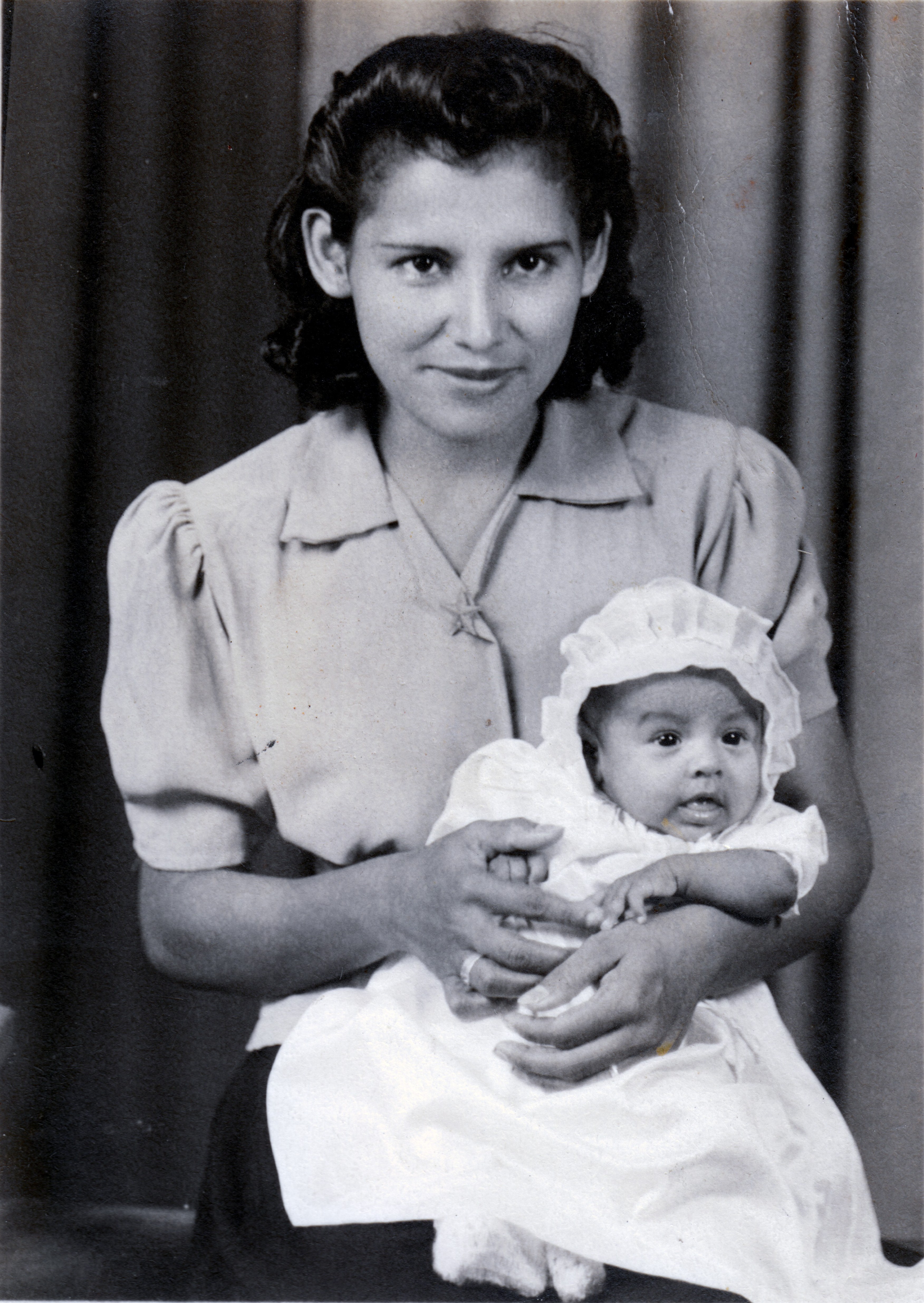
Did you know your dad?
No, I never knew my dad. My mother was not allowed to marry him. He would drink a lot and my Grandfather didn't want my mother to marry him.
It was just you 3?
Just us 3 then one summer when school was out, umm, my grandfather decided to go to Michigan to work as umm, migrant workers. We picked cotton, cucumber, tomatoes and spearmint.
Can you describe what it was like migrant working?
Well, I remember we used to get up real early in the morning, before the sun came up. Then when we got there I remember my mother putting on the "costal"(bag). She made one for me. My mother and Grandfather had their own.My mother would wear long pants and a long shirt with one of my grandfather's straw hats for the sun. And as soon as we could see we started to pick cotton. My Grandfather would have one line and me and my mother would have the other, and whatever my mother missed I would pick up whatever she missed. Some times she would leave some cotton for me to pick so I wouldn't get bored. I would get tired because the sun was very hot, because we did this all day long till it got dark. And when I would begin to cry my Grandfather would let me ride the "costal"(bag) cause it was filling with cotton.
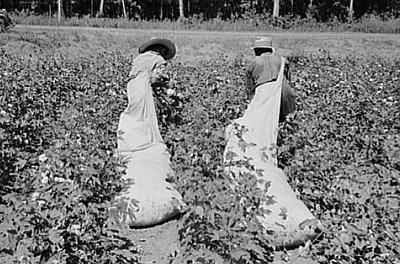
Did you only pick cotton?
No. When you're finished with that farmer's field they took you to another field. They would truck the families to another field. We picked tomatoes and spearmint. The spearmint the dirt was real soft and dark, dark black. And all they wanted for us to do was to pull the weeds when the plant was coming out. I would help, but most of the time I was playing with the little black frogs in the field. My mom would get after me. I would pick up 2 or 3 in my hand and walk for a while and let them go and pick up some more and let them go.
Can you describe the neighborhood you were living in before you moved to Michigan?
O.K., the neighborhood that we were living in before we went to Michigan they had like small houses, 2 room houses all around the neighbor, around the, like, like a block, and everybody would share the bathroom. The bathroom was in the center of that place there and then umm, when the ladies wanted to wash clothes you have to get up real early, my momma would get up real early so my Grandfather would put out the cast iron pot to boil the water to wash her linens and you have to be up there real early in the morning cause the ladies would fight for the clothes lines early in the morning.
Was the neighborhood for Mexican people only or were there White people too?
No, all the people there were Hispanics. They were all Hispanics people and people from Mexico. We didnít have no electricity, we used a Kerosene lamp. Uhh, the stove that my mother used was a 2 little burner Kerosene stove. No, no electricity.
By that time your baby sister Virginia wasnít living with you and your mom. Why?
Before we went over there, that summer that we went over there, probably that was a year before that was when my grand mother (Catarina) came to visit us and my sister Virginia was around 5 or 6 months old so she told my mother that she was having a hard trouble working and with 2 children to pay babysitting so my grandmother told her it would be better for her if she would take care of my sister and she would bring her every year to see us. So that is what she decided to do. So my grand mother took my sister to Oklahoma City.
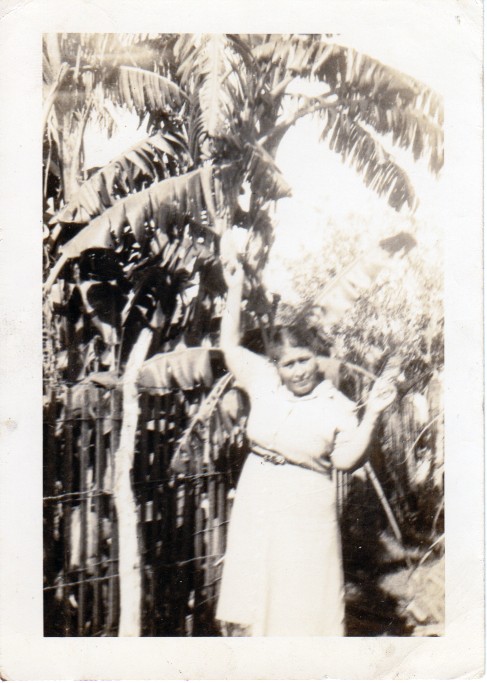
How did you feel about that? How did your mother feel about it?
I, I didnít, mmm, well mother was, she was very sad to let go but that was the only way she could survive with us 2 children and support both of us. But I missed my sister cause I didnít want her to leave, I didnít want her to go.
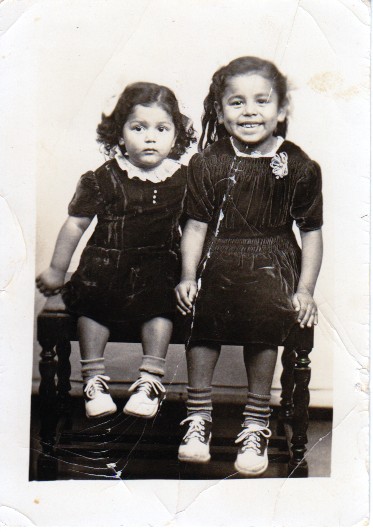
So from Michigan you and your mother left your grandfather and went to live with your Grandmother and baby sister in Oklahoma City. How was it over there?
I like it uhh, I saw my sister. I enjoyed it I saw my sister.
How long did you and your mother stay in Oklahoma City?
About a year.
Why did you all move back to Harlingen?
Grandfather would write to my mom telling her that he missed us that he wanted us back, and so, that was her father so she said that we were going to come back to Texas, to the valley to Harlingen so we came back.
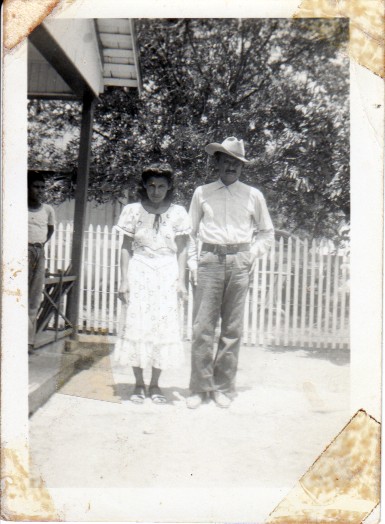
Why did your family move to San Antonio and when?
We didnít stay there for much because then his work he did ít have no more work thatís when my Aunt told my mother that there was a lot of work over here in San Antonio so we came to San Antonio and I stayed here since 1950.
Who did you all stay with?
When we came to San Antonio we stayed with my Aunt Juanita on Colima Street and there is when I started going to school to J.T. Elementary. We stayed with her about 3 or 4 months and then my Grandfather find a job and then my Mother find a job in a restaurant.
How was is like when you were going to school? How did they treat Mexicans?
When I was going to school I didnít know to much uhhh, I was a very quiet person and it was so different from the valley. I speak more Spanish that English till I picked it up till I learned it there in J.T. Elementary cause they want us to speak English no Spanish.
And you all spoke Spanish at home?
Spanish constantly. My mother spoke Spanish. She never knew how to speak English. She never know how to write her name, she never went to school because in those time it wasnít required and all the children were just going to migrant worker fields. Thatís all they did.
So you all are in San Antonio now and how old are you at this time?
I was already 9 going on 10, going on 10.
This is when your mother meet her future husband?
Yes. My other was working at a restaurant on Guadalupe Street, there was a restaurant there and she worked in the back helping the cook in the back washing pot and pans and helping with the cooking too and there is where she met my step-father. His name is Isauro Ramon.
How long was it after they meet that they got together?
They got together in around 52, yes around 52. Because we had already moved out from my Auntís house and we lived close to Lanier High School, some little house that were there, it was a 2 room, 3 room house.
That is when they started having children, the rest of your brothers and sisters?
Yes. After that we moved out from my Grandfatherís and Isauro, my mother and I lived in a little small house close to the Guadalupe Church is in the back itís an alley. Kay Castor alley, and this lady rented a small little apartment in the back so that is where we lived. So I walked to school because my school was close any way.
How many brothers and sisters do you have?
Alfred, Manual, Jose, Modesta, Lencho, Ester. Ester is the baby.
When the rest of your brothers and sisters were born did you help out with the chores?
Yes, I helped her each time she had her babies. I helped her with the children with my brothers and sisters and then we moved a lot of different places cause my step father would uhh couldnít hold up a job. He had different jobs and different things that he would do and my Grandfather brought him in my Grandfather was working for the city digging ditches and uhh he only worked for 2 weeks and then he didnít want to go to work he said that he was sick and then they wind up kicking us out from the houses because he never had money to pay the rent just one time and them the next month we have to move so we moved all around San Antonio in different areas, neighborhoods. But I never changed schools. I all ways gave the same address. I walked to school. I didnít care how many blocks it was I got up early in the morning and I walked to school. I never changed my address.
So you took on a lot of responsibility helping to raise your brothers and sisters.
Yes, yes. Thatís why I think thatís the way I am all ways cleaning and doing things, pick up after everybody cause I was already used to doing that from very small.
Was life more of the same from the ages of 9,10 years old to your high school years?
After that, that I noticed that we were moving a lot, I told my mother that I wanted to go live with my Aunt because I got tired of leaving, of going, living here and living there, changing, changing neighborhoods so I talked to her and I told her that I wanted to go and be with my Aunt so she said okay. I think I was around 13 or 14 when I left my motherís house and went to live with my Aunt.
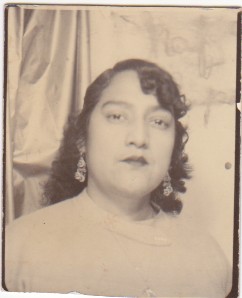
How was it living with your Aunt Juanita?
With Tia(Aunt) it was okay but then my Uncle too used to drink everyday so I jumped from oneÖ.
Thatís Tiaís husband?
My Tio (Uncle) Carmelo, my Auntís husband. So I got out of one situation and went to the same thing.
How long did you live there with your Tia Juanita and Tio Carmelo?
I stayed there till I got married.
Till you met Dad (Ernesto Flores)?
Uh hu, till I met your dad.
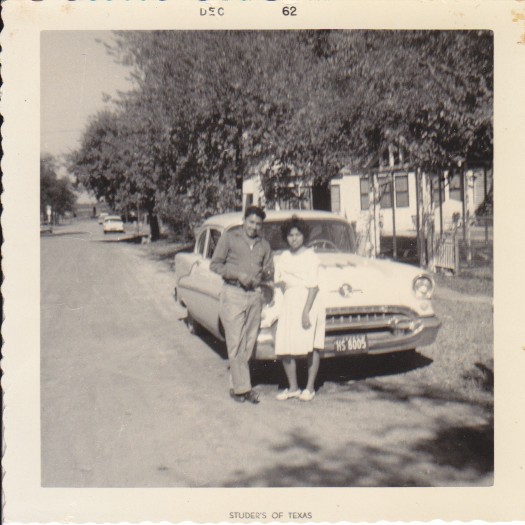
How long was that?
Okay I was around 14, yeah around 13,14. I drop out of school in the 10th grade and I started working in a restaurant down town in San Antonio as a waitress. I met your dad when I was 18 years old.
When you met Dad you were working as a waitress.
I was working as a waitress. I was working nights from 6 to 7 the next morning.
Did you get paid a lot?
No, it didnít pay a lot but I got good tips, every night we got tips.
What would be a good day or week for you in terms of how much money that you would earn?
The good, the days that were good, that a lot, the other ladies too had good tips was Fridays and Saturdays and sometimes Sundays or the Holidays like for Fiesta week or things like that.
What would be considered a good day in terms of money?
Let me see. About, I think I made one time about $40 or $50 something like that. For one night you know like on a Saturday. But then on the weekdays uhh, like $15, $20 or maybe less depends on the customer. Cause we knew, we the waitresses knew the ones(customers) who would leave tips. And you would know the ones that wouldnít leave you anything. But anyway you had to serve them weather they would leave you a tip or not.
When you met dadÖ..
I met your Dad in, we dated for 3 months and then he asked me to marry him. I couldnít believe it and I started laughing. To me it seemed so funny that he would ask me cause I just knew him for 3 months.
What was dad doing for employment?
Your dad was a cab driver. A taxi driver. He was very shy, he didnít want to talk. But his friend was with him all the time. He would tell me "My friend here wants, wants to ask you whatís your name", and I said, well, doesnít he talk, doesnít he have a mouth to ask me. He didnít say anything. He was very quiet.
How long after you and Dad got married that you had your first child?
1964. (3 years, married in 1961.)
So, after you had your first child were you all still living in San Antonio?
Yes. When we had Norma(1964), I wanted to be close to my mother so we moved in the same block as my mother lived. It was Vera Cruz. Now I remember. I lived by about 2 bocks where my mother lived on Vera Cruz.
Who was your next child?
Cynthia. She was born 66.
How did you and dad come about buying the land that we live on now?
When my mother bought their land over here we started coming over here spending time with her and my other brothers and sisters. We used to come on week ends and stayed over here then uhh my cousin(Bertha) was living here and so told us that they were selling a lot so we bought we started buying third lot on Cinco de Mayo. We gave $25 down and $25 a moth. But we lost the land cause we only owed about $300 and we were, we lost it. But them my brother Jose told us about the house that right now that Mr. Cabrera was selling his land soÖ
You bought that one?
Yes. We gave him $100 dollars down and we paid him $50 a month.
Were you working at that time?
I worked, let me see. I started working at the school. Norma started going to school over there at uhh, Austin Elementary where I started working for Pre-school, Pre-Kinder.
What area of the school were you working at?
In the cafeteria in Stephen F. Austin Elementary. And I went at 8 oíclock and I was home by 1:30. Just a couple of hours a day.
How did you feel about working in the cafeteria? Did you enjoy your job?
I enjoyed my work in the cafeteria. I enjoyed working with the ladies. It was a hard job you know, the cooking and the pastry, and the rotation and umm, we had to rotate washing pots and pans and the heaviest days was grocery days. When the groceries came in but we all helped each other.
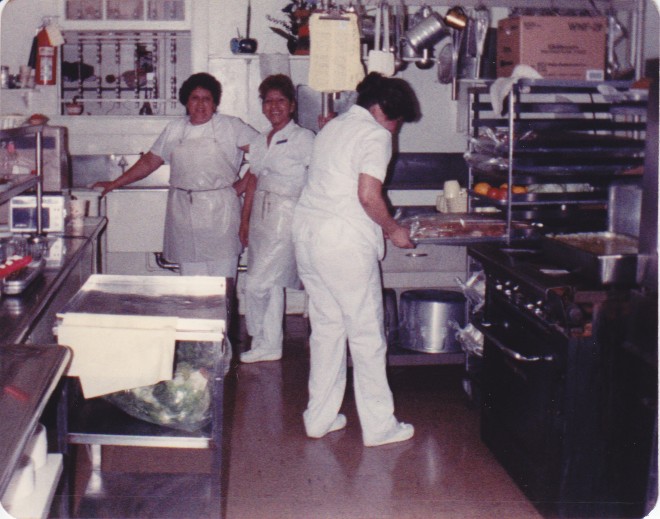
Who else was working with you? Was it Mexican people, Black people, White people?
When I was working there it was all of us were uhh, wait. Let me see. One colored lady was a cook, and the manager was a German lady and all of the other ladies were Hispanic, and we could not, the lady would not let us speak in Spanish she said we have all to speak English.
Weíll fast forward to when I was born in 1976...
Uh hmm, 9 years, 10 years.
Did anything happen from the time that you all moved here(Meadowwood Acres) to when I was born in 1976?
Well, when you were born I was still working in school. I was still working and then after I had you I went back to work and then I got pregnant again and I was pregnant with Mandy(Forth child. Born in 1977.) and then I uhh I stopped working because it was going to be too much for babysitting.
Didnít you say that Grandma passed away in 1974?
Yes, mother passed away and uhh, and then uhh, 2 years after my mother passed away my step father passed away. The girls(Maria's younger sisters) stayed there in the house with my brothers.
Didn't you also tell me that your younger brother Lencho passed away. Can you tell me what happened?
He was in a truck accident. This friend of his picked him up from his house to go to a friends house to watch a football game. His friend was driving and Lencho was in the middle and Danny(my cousin Bertha's son)was on the right. And he was going real fast when he went out of controll and hit a tree. His friend that was driving had broke some ribs, Danny had broke a leg, and Lencho flew through the windshield and he died. He was 19.
Growing up, I remember that we didnít have a lot of money.
No. We had an outhouse in the back.
I know that dad didnít work that much.
No. When he started getting sick he couldnít go back to work. He couldnít keep a job because he couldnít go back to work because of his problem that he had. He couldnít breath, he couldnít bend over to much because of his. He started getting sick.
His heart condition that he had.
His heart condition that he had. But he was very stubborn. He didnít want to go to the doctor.
Did dad smoke?
Yes he did. When he drank he smoked. He started when he was young and smoking when he was very young.
Dad passed away in 1991?
Yes, 91. He was 56.
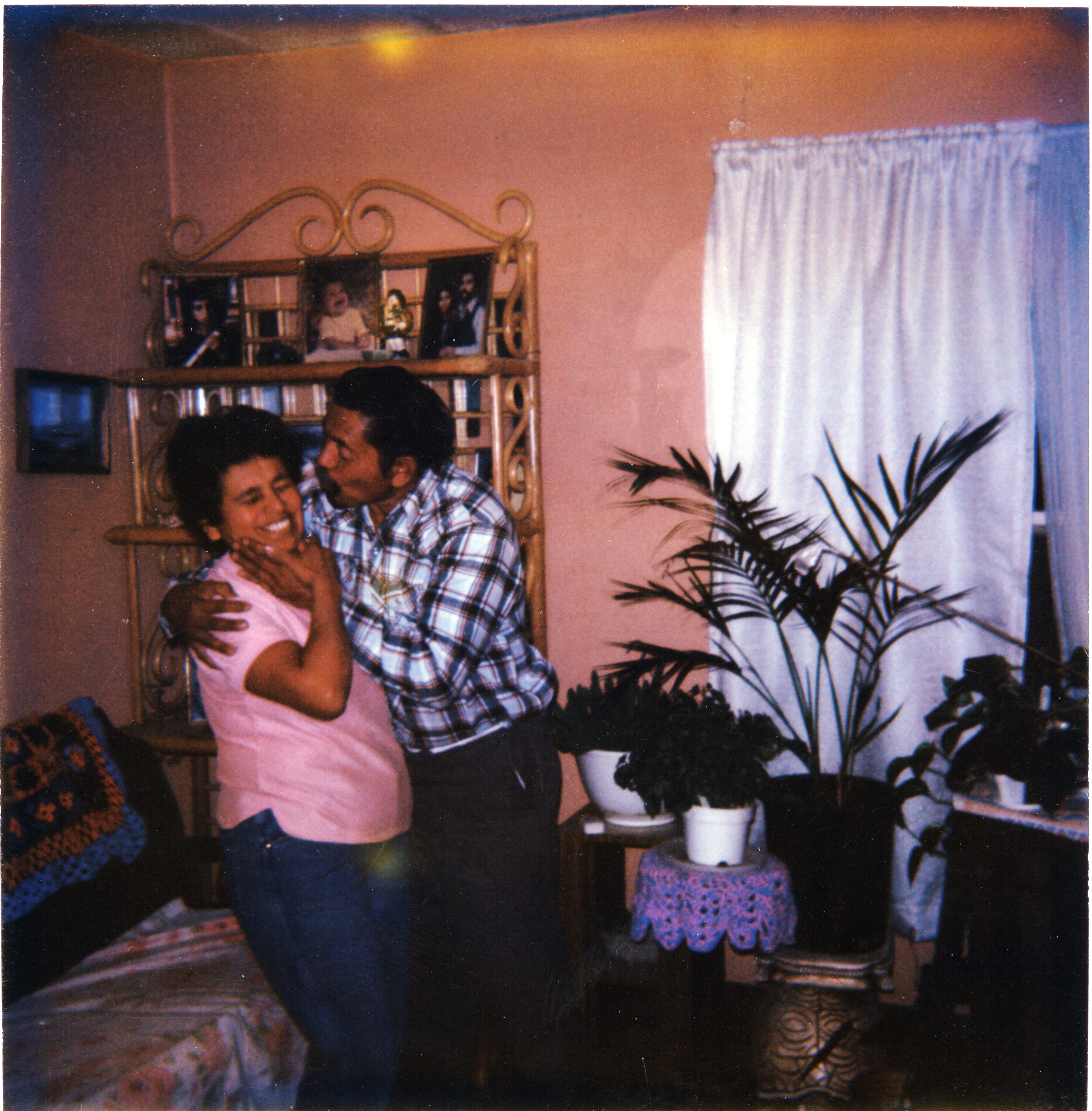
How did you feel after dadís passing away, in terms of finances, having no money?
Well, it was hard. It was hard to be just one parent. You miss the person after so many years. We were married for 29 years. And I got used to the idea of getting up early and making breakfast and then I missed that, I mean you know, cooking and all ways cooking and I got used to cooking all of the time.
You retired from the S.A.I.S.D. in 2003, what do you do?
I umm, I baby sit my grand kids, I take them to school. I have time for my garden, for my plants and I do a lot of sewing. I do some quilting and some little bit of arts and crafts that I like to do.
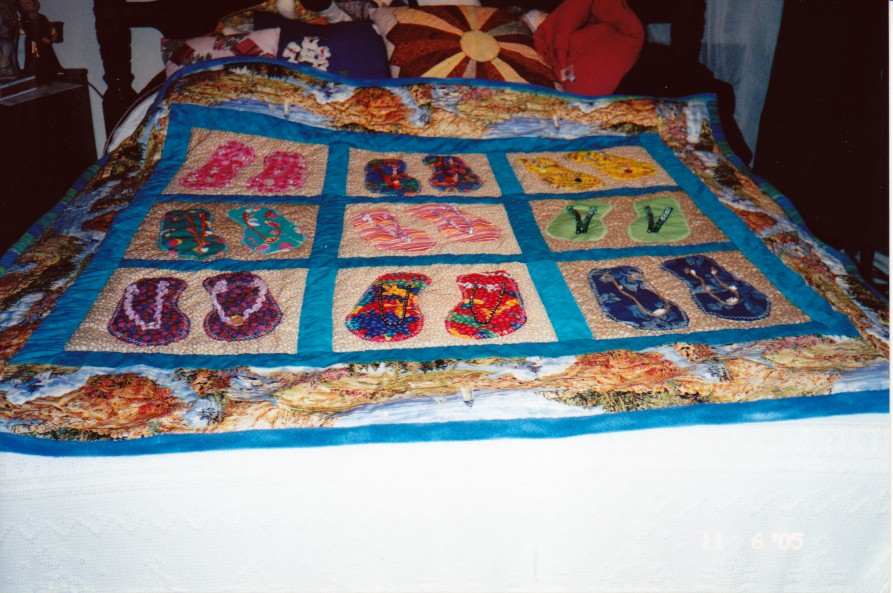
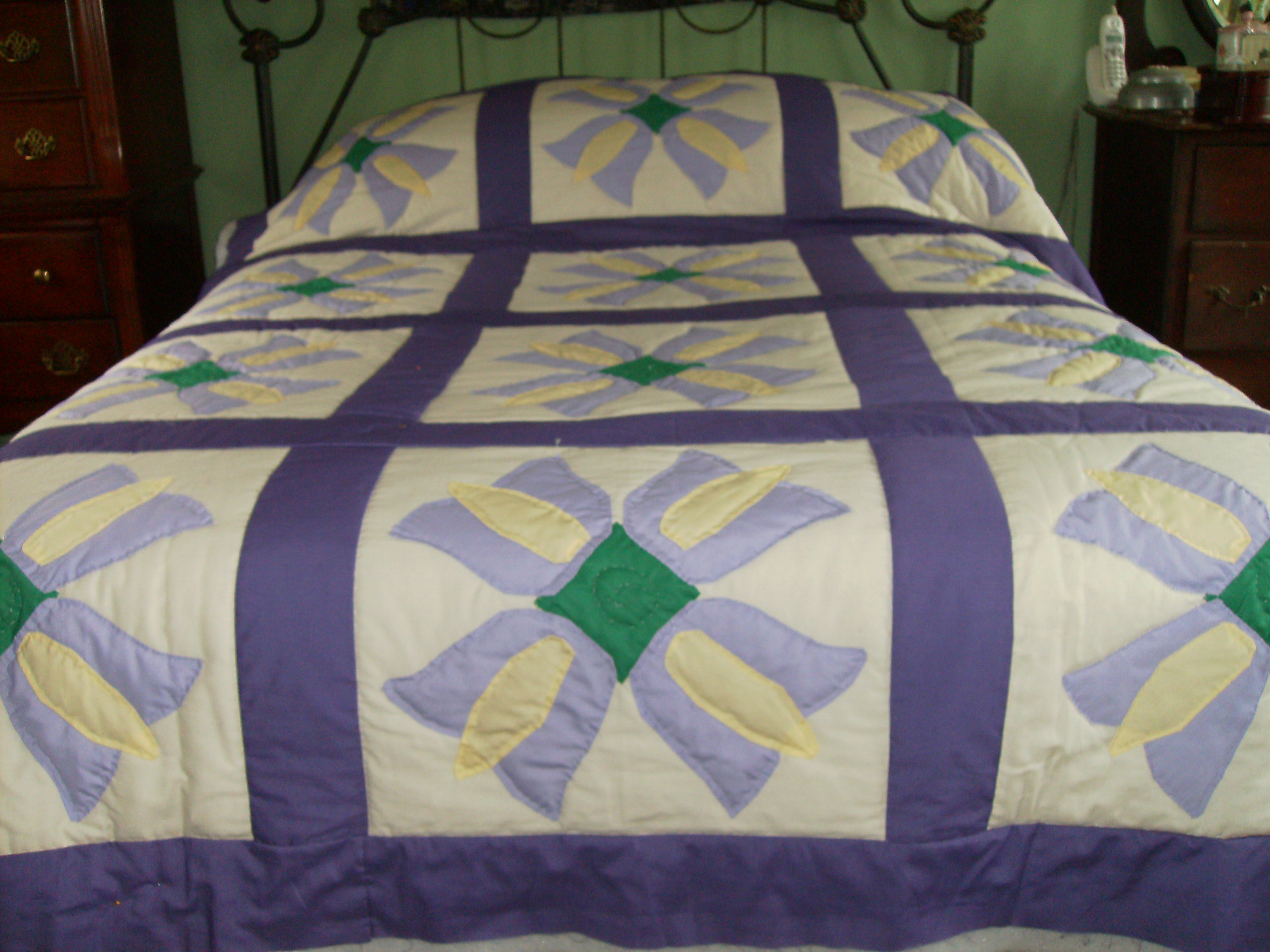
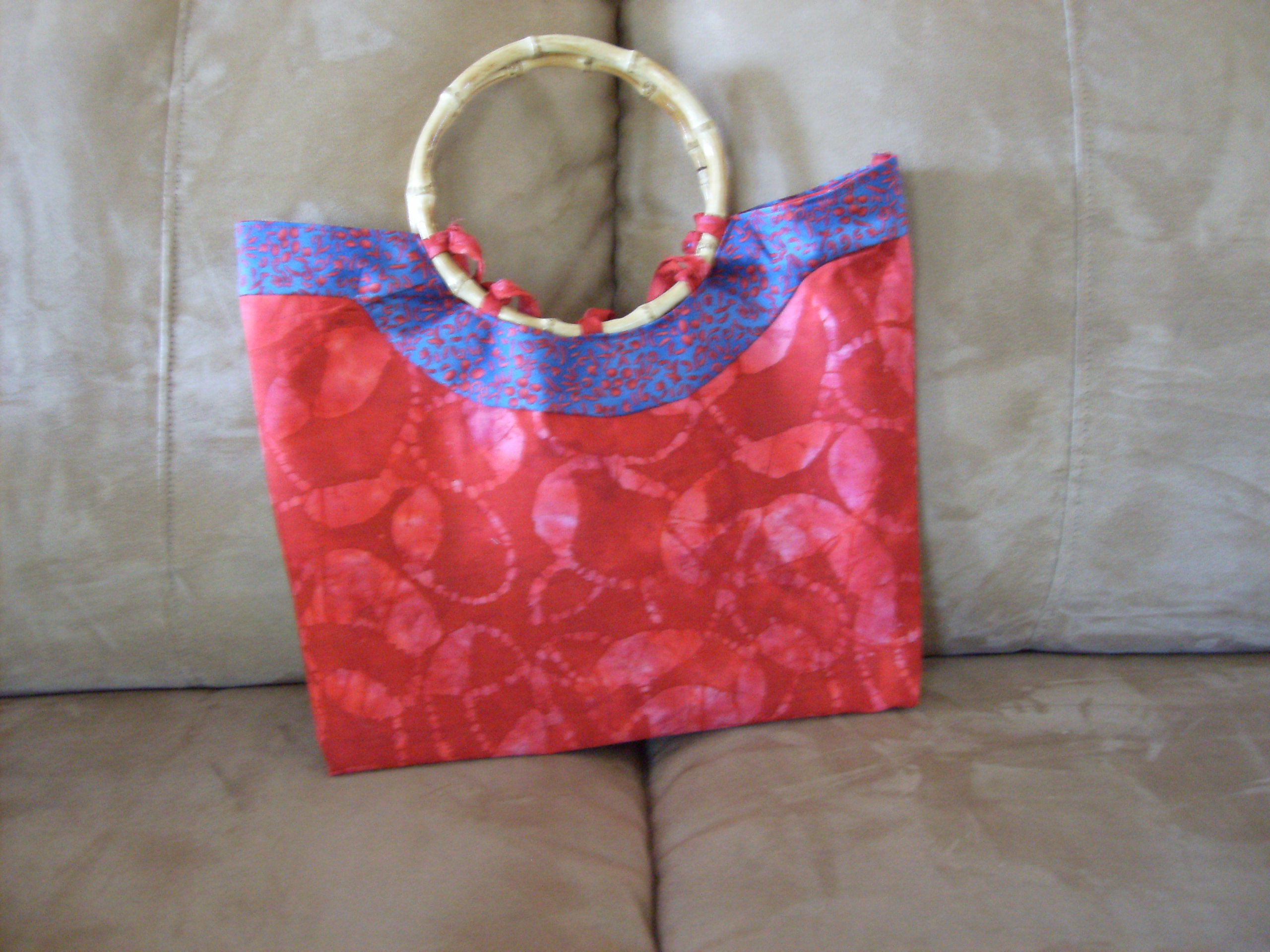
Is there anything else you would like to add to this interview?
Well umm, I would like to say that now women have more opportunities in different positions in jobs. When I was, you know like women can, like us when we worked in the cafeteria you have a, you know you can move up to be a manager or supervisor or things like that. To me now women have more opportunities of different positions in different jobs.
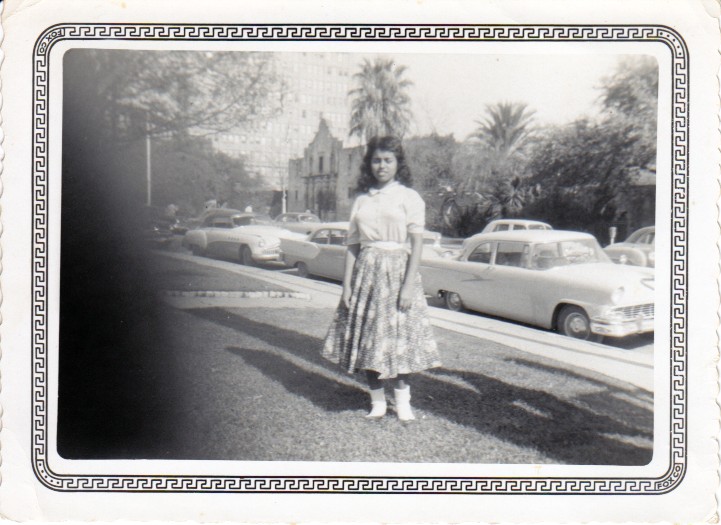
Do you have any advice for younger women?
Well, the advice that I would like to say is the first thing is education. To finish your school cause I never did finish school. And to me I think thatís very important now a days to finish your education and to know what it you want to do with your life, to better yourself. To better yourself as to the future that you want to have for your self and not to marry too young. First is your education. I donít mean not to get married, but to me the best thing any young woman can do or men is to finish there education before they go through that step of marriage. Because now its very hard. When you get married young you start having children then its hard for the women to finish the school and work and take care of the house. Its hard. Unless you have some body that will help you out like your mother or somebody in your family.
Anything else that you wouls like to add?
I remember once when I was small uhh, when my mother was working, we went to uhh pick up my mother from work, this was in Harlingen and uhh my Grandfather asked the manager, the man there if he could go inside and buy me a hamburger for me and my grandfather and he said that we couldnít go in there. We were not allowed. Only white people. No Hispanics and no blacks were allowed and my grandfather told the man I have money, my moneyís good. He said, You can buy the hamburger for you and your grand daughter but you can not eat it inside. So my Grandfather and I ate the hamburger and the soft drink outside on the back steps of the restaurant. He did not allow us to go in.
How did you feel about it?
That was a very bad feeling. You never forget that. You never forget that feeling.

